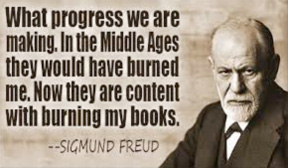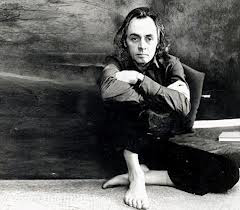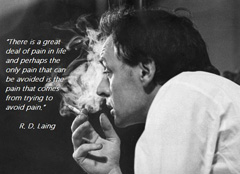What is Free Association, Inc.?
Free Association, Inc., is a non-profit organization founded in 1988 by Dr. Michael Guy Thompson and colleagues who were affiliated with R. D. Laing in London to provide an alternative to conventional psychoanalytic training in the San Francisco Bay Area. Its mission is to further the dissemination of psychoanalytic ideas; to integrate the technique of psychoanalytic practice into an existential-phenomenological perspective; to further the use of psychotherapy and psychoanalysis with psychotic process, in particular schizophrenia; to organize lectures, seminars, conferences, symposia, and other educational programs to further these ends.
Free Association questions whether the medical model, upon which clinical psychology is based, is a desirable foundation for cultivating a genuinely interpersonal perspective, free of the diagnostic conventions that inform contemporary clinical practice. We situate psychoanalysis in a more philosophical frame of reference, emphasizing a predominantly existential sensibility that is free of the prevailing dogmatism that characterizes institutional psychoanalysis. This foundation may, in turn, help students make sense of the ever-changing plethora of treatment strategies that pervade the mental health professions.

TRAINING PHILOSOPHY
Conventional analytic training favors a technical orientation, typically learned by rote, that neglects the primacy of the practitioner’s personal experience. Free Association was conceived in response to the increasing medicalization and technologicalization of the mental health professions, including recent trends in psychoanalysis.
Our approach favors those analysts who, after Freud, see the clinical relationship as a personal endeavor, who view psychopathology as a matter of the heart. We believe analysts and students alike need to reinvent the wheel so that, like Freud, Ferenczi, Reich, Winnicott, Laing, Lacan, and others, we base our thinking on lessons learned from the personal struggles that have made us who we are, culminating in unique, perhaps wayward, points of view.
Students are encouraged to become familiar with the basic principles of psychoanalysis and to be flexible when encountering the evidence of those principles in their work. The practice of psychoanalysis and, hence, its efficacy cannot be learned from a distance, but evolves out of each analytic encounter. That is why psychoanalysis is not merely a technique among others, but a way of coming to terms with the human condition.

R. D. LAING
THE SALON MODEL
Conventional training schemes are modeled on the academic approach to learning that emphasizes a theoretical orientation. This has its place and has flourished in the university setting. This is not the ideal way to learn psychoanalysis which, due to its intimate nature, derives from what we learn about our relationships with others, in close quarters. The salon model is celebrated for its uncommon sense of informality, and was adopted by Freud and his earliest followers.
We believe students learn best when not subjected to excessive instruction, when they are free to pursue what moves them. The salon provides a forum where participants are invited to share their understanding of the world, free of the competition that is characteristic of conventional psychoanalytic training. Themes from typical seminars include the classical texts of phenomenology; the existential dimension to psychoanalytic technique; a familiarity with the Greeks and their impact on psychoanalytic thinking; anti-psychiatry and a critique of the social sciences; the basic tenets of Buddhism and kindred practices.
OFF-THE-GRID PSYCHOANALYTIC TRAINING
Off-the-grid psychoanalytic training is so-called in a double-sense. First it refers to the concept of training itself. Instead of creating a formal, by-the-book structure with a curriculum, so many hours of instruction, supervision, personal analysis, and time seeing patients, all of which meet some standard or other that culminates in a certificate of some kind, which is in turn accredited by an external body for legitimation, off-the-grid training dispenses with that. It is not formal but informal, with a laissez-faire, even Bohemian sensibility. We see no point in quantifying, or even assessing what you have learned, as is typical in academic settings. The salon is a gathering place where seminars and lectures are unremittingly flexible and informed by what each instructor brings to the table, alive to the needs of each student. Because our approach to psychoanalytic training is multidisciplinary we include readings in existential philosophy and spiritual disciplines.
Length of training varies and culminates when the student sees no need to continue. Students convene at a time and place and conduct themselves attentively, out of consideration for the integrity of the milieu. Students seek analysis with whomever they wish to and are supervised by practitioners who are associated with or approved by Free Association. A Certification in Psychoanalysis is awarded upon completion of training.
The second sense of off-the-grid training refers to our concern to de-medicalize the analytic process. This includes a critique of diagnostic conventions, and how diagnosis may be retained as a metaphor without mistaking it for an illness. Students are encouraged to entertain other ways of considering what the concept of diagnosis might mean when applied to the types of conversing that the therapeutic process entails. Diagnostic categories are explored in order to appreciate how, for all intents and purposes, we are all more similar than we sometimes suspect. We all know what it feels like to be neurotic, psychotic, depressed, bi-polar, paranoid, even schizophrenic, if only in a relative sense, otherwise it would not be possible to empathize with our patients. If there is no such thing as “mental illness,” we question what role medicating psychotic or depressive symptoms properly plays. While there may be some short-term benefit to such strategies, we are not so sure they offer a viable long term solution. Perhaps being a little crazy, under certain conditions, is the best option available?
Despite the convention of clinical licensure in the state of California, we feel obliged to look at the business of psychopathology, diagnosis, and treatment from another angle, and to explore ways of articulating the issues our patients bring us in the most ordinary, non-technical language possible. This can only serve to enhance our capacity to empathize, and in turn connect with them.
![]()
R. D. LAING AND TREATING SCHIZOPHRENIA
Free Association is modeled on the work initiated by R. D. Laing at his experimental treatment center at Kingsley Hall, London, in the 1960s. The principals who founded Free Association trained personally with Laing and are committed to providing relief for those suffering from psychotic process, including schizophrenia, in either outpatient psychotherapy or in a residential but non-institutionalized framework.
Free Association is currently exploring setting up a residential household for those suffering from an acute psychotic break or more chronic conditions. We are also available to consultations to discuss options, either in person at our offices in San Francisco, or via telephone or Skype if you live outside the San Francisco Bay Area.
We believe that medicating psychotic symptoms is a short-term affair and not an ideal long-term solution.
If you or a family member is suffering from an extreme condition that you cannot cope with satisfactorily we would be happy to talk with you and offer a referral or discuss other options.
For referrals or more information, contact Dr. Michael Guy Thompson by phone or by email by visiting the CONTACT page.
FREE ASSOCIATION, INC.
2196 Union Street
San Francisco, CA 94123
![]()
